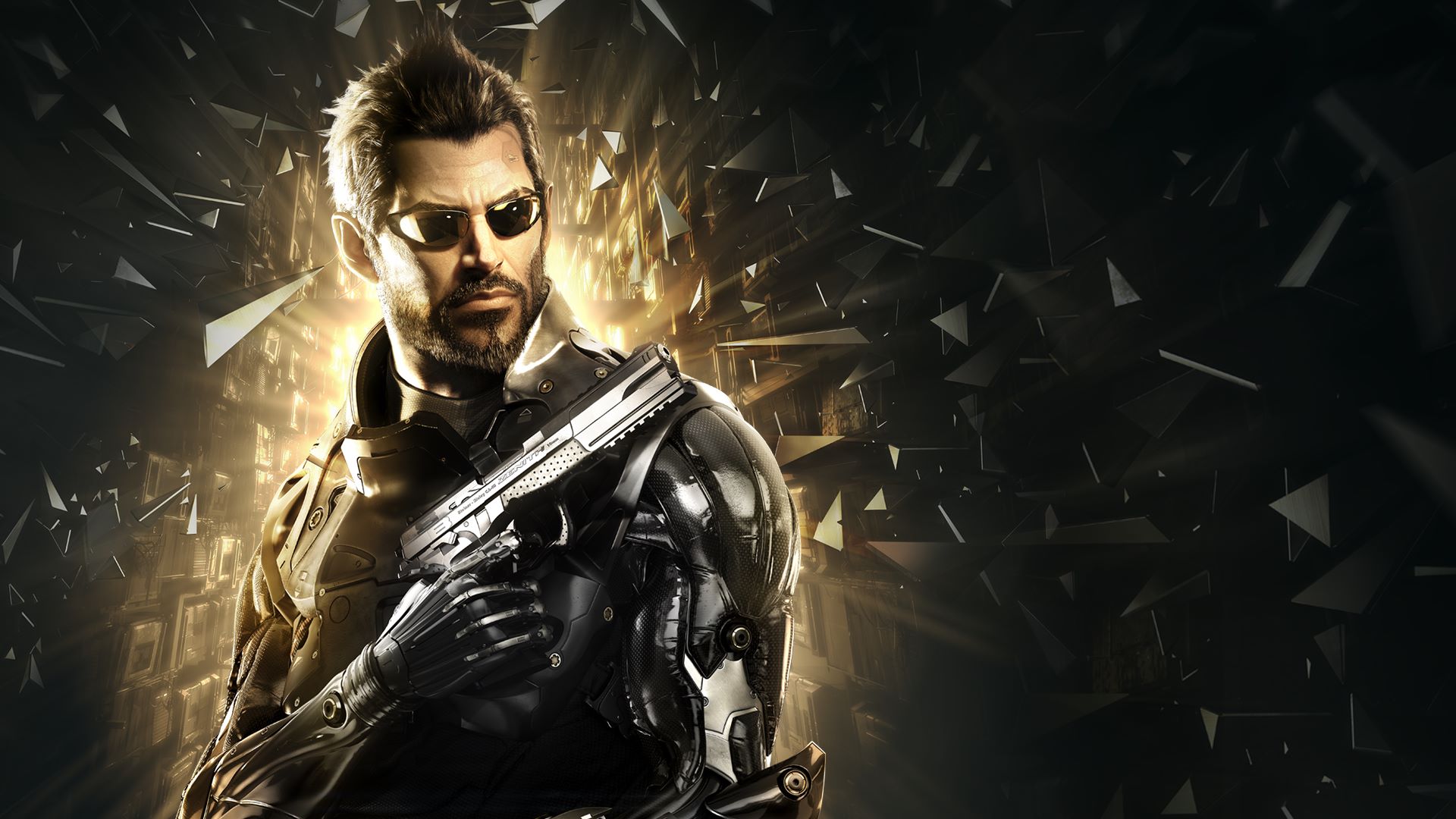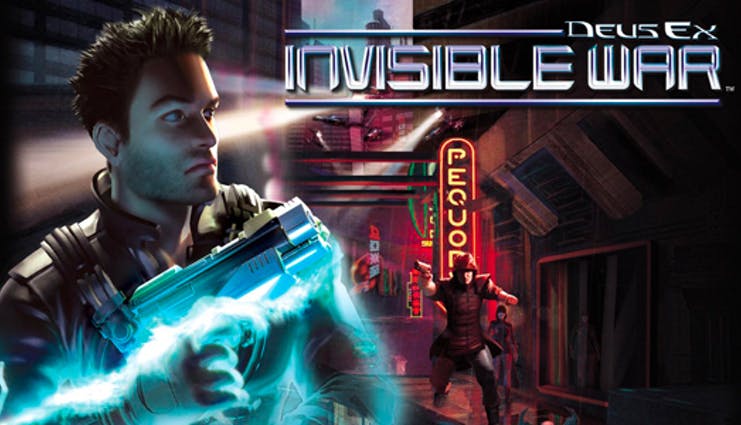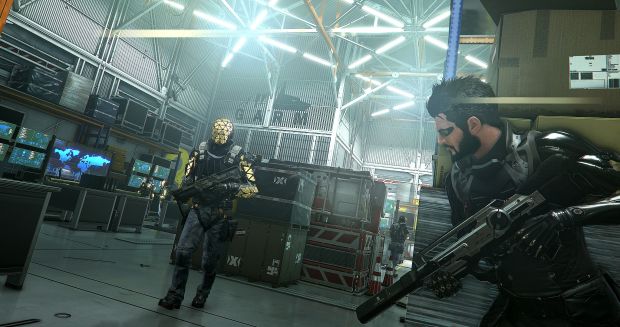
As far as hybrid-genre action games go, Deus Ex is a role playing franchise that deals with relatable themes, especially today, as concerns about the future and thoughts of dystopia may mount. With the difficulty of life in general, the idea found in Deus Ex that conspiracies abound in life, itself already likely depending on whom you speak to, easily finds cache amongst players skeptical about the world around them. But just what is Deus Ex? Why haven’t we heard of anything from the franchise in a couple of years?
Even if you “never asked for this,” we would like to present you with our feature on- what the hell happened to Deus Ex?
Deus Ex started with its self-titled first game, released in 2000. Set in a cyberpunk world in the mid 21st century, an agent named JC Denton fights, in the flesh, against secret societies and gangs using powers given to him via nanotechnology. The world in this game is rife with economic inequality, with the Earth also being ravaged by a pandemic called the Gray Death. There is a vaccine called Ambrosia, but only in limited supply, and it being designated for those who are deemed important to society further accelerates social tensions to the point of rioting and decay.
By the end of the game, three different factions solicit Denton’s cooperation in bringing about a future of their own vision, and players can choose which sort of future to bring about. The first Deus Ex game is widely regarded as a success; worldwide, it has sold more than one million copies, and the game is well-loved by fans, enjoying its own modding community due to being built on Unreal Engine.
The next game is Deus Ex: Invisible War, released in 2003, and a direct sequel set twenty years after the first game. It canonizes a set of actions from JC Denton in the first game, which still end up producing a period of time called the “Collapse” – defined by economic depression and war, and major cities begin to surveil and control their population. The main character, Alex D, is a student at the Tarsus Academy, an educational institute network brand, and the story also follows some of Alex D’s fellow students, who align themselves with other factions during the course of the story.
The plot can take other turns at the end, including instituting a global surveillance state by siding with the Illuminati, or a world that features the elimination of biomods altogether. Invisible War enjoyed commercial success in the form of having more than 1.2 million copies being sold worldwide, and enjoyed great critical reception amongst many gaming outlets, as was the case with the first game.
The previous two games, developed by Ion Storm, would mark the only releases in the franchise for several years, until 2011, which saw Deus Ex: Human Revolution being released. It is set in the year 2027 and features Adam Jensen as the protagonist. Jensen works as a security lead for Sarif Industries, which works in augmentation technology. One day, a group of augmented terrorists called Tyrants attack Sarif Industries, and among the presumed dead is Megan Reed, Jensen’s ex-girlfriend. While investigating another Tyrant attack, Jensen comes to learn that a Tyrant behind the second attack is being remotely controlled by a hacker.
The end of the game sees Adam Jensen traveling to the supercomputer broadcasting the signal, while being lobbied by other faction leaders to serve their interests and visions for their future. Jensen can use the broadcast from the supercomputer to choose to further support or harm the development of augmentation technology, support the Illuminati in their bid to stigmatize augmentations, or even destroy the supercomputer altogether and broadcast nothing. The ending is also meant to serve as a set-up to the events of the first Deus Ex game. Human Revolution sold even better than the first two games – by November 2011, it had sold 2.1 million copies between North America and Europe, with Europe being responsible for more than half of that figure at 1.38 million.
As with the past two mainline titles, the critical reception was also generally favorable across the board. The last mainline entry in the series is Deus Ex: Mankind Divided, and once again stars Adam Jensen as the protagonist. Set two years after the events of Human Revolution, Jensen returns implanted with more advanced augmentations, and society has become stratified along their opinions of augmentations. On one side are humans who are augmented, and on the other are those who oppose it on principle or cannot afford augmentations. Canonically, the supercomputer from the end of Human Revolution is destroyed, but this action also allows the Illuminati’s messages of prejudice against augmented humans to take hold and further stratify society. Adam Jensen works for an anti-terrorist group called TF29 and the Juggernaut Collective, the latter of which specifically opposes the Illuminati.
While the critical reception for Mankind Divided was on average positive, it could still be fairly characterized as slightly less favorable than the previous three mainline titles. The sales for the game, compared to previous iterations and accounting for all its platforms, have generally been seen as underwhelming compared to past titles, a sentiment in part reinforced by Square Enix’s limited commentary on the game’s commercial performance. Though it should be said that this title was the Deus Ex series’s debut on the current generation of consoles, and the limited install base at the time of release likely impacted commercial performance and momentum. Mankind Divided’s story is accompanied by three pieces of DLC, collectively referred to as “Jensen’s Stories.” Mankind Divided’s ending leaves a massive opening for a sequel that explores the tension between Adam Jensen and the Illuminati, the latter of which are portrayed as corrupt and evil and have infiltrated TF29, and Adam Jensen and the Juggernaut Collective.
While Jensen supports destigmatizing augmented people, the Juggernaut Collective keeps their leader at a distance from him, and the Illuminati are planning to follow Jensen in hopes to get closer to their leader. Warren Spector, who worked on the first Deus Ex and oversaw the development of Invisible War, has expressed interest in working on a possible sequel, offering ideas on what he thought of Mankind Divided, though it must be said that Square Enix is the current owner of the Deus Ex IP.
Yosuke Matsuda denied the death of the Deus Ex IP in 2017 and stated that their development pipeline at the time meant focusing on other titles, and in 2018, David Anfossi of Eidos Montreal stated that the franchise needs to be handled respectfully and that Eidos Montreal has been discussing what they want to do with the next game, echoing comments similar to Matsuda’s own. So it would seem that the relevant parties are interested in pushing a new Deus Ex game; it’s just a matter of time and development resources and priorities being freed up for Deus Ex, if these comments are anything to go by. Be sure to let us know what you want from the next Deus Ex, which would almost certainly be worked on by Eidos Montreal. What do you think of Mankind Divided, and when do you think a new game could be announced – would a new Deus Ex game be released before the PS4 and Xbox One’s successors? Let us know in your comments.
















